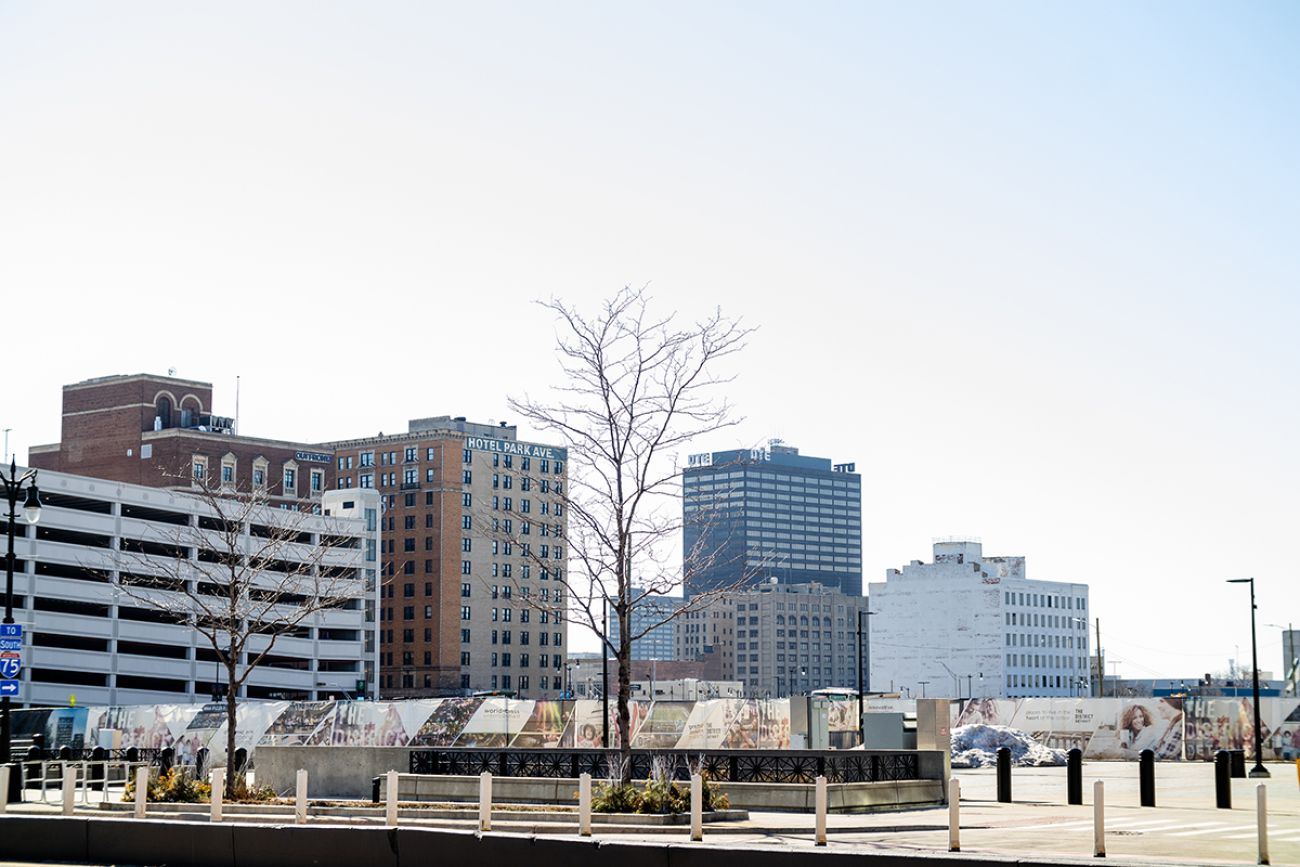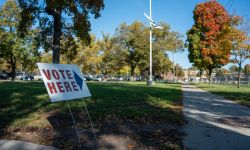State board OKs $615M incentive plan for District Detroit

A state board on Tuesday approved a $615 million incentive package for the District Detroit, a sprawling vision to reinvent an area north of the city’s downtown.
The Michigan Strategic Fund’s 9-1 vote came after more than two hours of public comment on the proposal and several other agenda items before the board. Commenters argued both for and against the crucial vote for District Detroit, a joint $1.5 billion venture of the billionaire Ilitch organizations Olympia Development and Stephen Ross’ Related Cos.
The project includes construction at 10 sites, including the renovation of several existing buildings and the development of new buildings on several surface parking lots and a vacant block. Developers expect to create 1.2 million square feet of new office space, 140,000 square feet of ground-level retail space, 460 new hotel rooms, 695 new rental housing units and 504 parking spaces.
Related:
- Detroit police have new plans to prevent downtown violence
- Detroit OKs $748M in tax breaks for $1.5B downtown redevelopment
- Water taxis to make a comeback on Detroit River?
The Transformational Brownfield Plan was one of several proposals that came together to form the overall incentive plan for District Detroit. All told, the developers expect $800 million in costs will be reimbursed with taxpayer funds over the next three decades.
Detroit City Council members voted last month to advance the brownfield plan after six hours of public debate, despite opposition from some residents over massive subsidies from the city for wealthy developers. At that time, the council also created special boundaries allowing for $133 million in tax breaks for the project that will come back for a final vote later this year.
Council President Mary Sheffield was the lone “no” vote for the brownfield incentives, arguing last month that stronger language was needed to ensure that the developers follow through on commitments to support Detroit businesses and hire residents. Other council members argued the city needs jobs, housing and revenue promised with District Detroit.
Longtime resident Frank Hammer reiterated some of the skepticism Tuesday, urging the MSF to “think about the optics” of District Detroit.
“We are the city with the largest urban bankruptcy in U.S. history. The bankruptcy occurred 10 years ago and the city is trying to come out of that.”
“It’s very clear to me,” he added, that billionaires “are trying to take advantage of that.”
But others, like Chris Jackson, chair of the nine-member Neighborhood Advisory Council put into place to negotiate benefits for Detroiters impacted by the project, said the advisory group met for over 13 weeks, engaged residents across Detroit, worked with city leaders and with the developers.
“District Detroit is no different than any other part of Detroit. It is a neighborhood,” said Jackson, who conveyed his “full support” for the district.
Jackson said that the $167 million benefits package covers affordable housing, employment, training, arts and culture, accessibility, parking, transit and other amenities.
“We will stay engaged with the developer throughout this whole process,” he said.
Fellow advisory group member Deirdre Jackson also conveyed her support of the project.
“Most notable from my perspective is the commitment to go above and beyond ADA (Americans with Disabilities Act) compliance. Hopefully this will set a precedent. It will reduce and ultimately eliminate barriers for all,” she said Tuesday. “Equally important is the growth and revitalization of our city to maintain competitiveness in the nation, which will inspire others to be part of the city’s history of brilliance and tenacity.
“This development sets us on the path of restoration,” she said. “It will keep our talent here.”
The developers have touted the District Detroit as a project that will bring “inclusive economic impact” to the city and state, including thousands of jobs and much-needed affordable housing.
The investment, the development team has said, will spark construction of new real estate, increase population density and support sports, entertainment, shopping and dining.
The continued promises don’t convince Detroiters like Anna Harris, who called the project a “false dichotomy,” of “we pass the District Detroit deal as it stands … or everyone leaves and the city crumbles.”
“Either we fork over billions to billionaires or we get nothing,” she said. “Vibrant cities are not an island of suburbanite playground of parking lots, chain restaurants and big box stores.
“I sure don’t think we should be subsidizing those efforts with desperately needed public funds,” she added.
A representative for the Detroit Tenants Association also joined commenters Tuesday, citing the failures of developers – including a past proposal for the District Detroit that did not materialize – and the impacts of that for large areas in and around downtown that are vacant and in disrepair.
The tenant group is pressing for smaller developments that can be owned and operated by residents and reinvestment in public schools, health and social services and transportation.
The brownfield plan promises “symbiotic growth” between business and educational institutions as well like Wayne State University and Cass Technical High School, TechTown, the Ford Mobility District and DTE’s Detroit corporate campus.
The project is expected to encourage new residents to move into Detroit from throughout the state. Developers say college graduates will also have more reasons to stay in Michigan, which has long been a priority for state and local policymakers.
Developers won’t receive the tax revenue if they don’t follow through, a component of the approval that representatives repeated ahead of the Tuesday vote.
The brownfield plan can be terminated if the developer fails to make any steps toward building the sites within two years, or if no actions are taken at a specific site within five years.
It’s anticipated that the project will create $751 million in net revenue for Detroit over the 35-year brownfield plan. State revenue is expected to increase by $1 billion over the lifetime of the deal.
Detroit’s Downtown Development Authority is also expected to receive $349 million in additional tax revenue during the next 35 years. Other taxing jurisdictions like the Detroit Institute of Arts, Wayne County, Detroit Public Schools and the Detroit Public Library will receive $49 million total.
District Detroit projects are estimated to create 12,450 on-site construction jobs with an annual average wage of $70,000 per year, and approximately 5,790 post-construction jobs with an average annual income of $95,000 per year.
Nicole Sherard-Freeman, who heads workforce development for the city, said District Detroit will have a positive impact on economic impact in the metro area, across the region and for the state as a whole.
“It’s not just about economic impact but (the impact) on talent,” she said. “These are not low-income jobs. This will help rebuild the middle-class of Detroit.”
Sherard-Freeman noted that right now the parcels being targeted for the development project generate about $249,000 per year in tax revenue. Once fully developed, she added, those 10 properties will produce $21 million per year for the city’s General Fund to support city services including parks, recreation, services for children and adults.
“There is huge benefit over the long term for this project for the citizens of Detroit,” said Sherard-Freeman, adding “not a single Detroiter will be displaced as a result of this project” and “we just think those are important (details) to call out.”
MSF Board Member Ronald Beebe asked Tuesday whether there are clawbacks if District Detroit fails to provide the temporary or full-time jobs laid out in its proposal.
Sherard-Freeman said the city, under executive order, requires that 51% of hours worked on a construction site be performed by Detroiters. It’s measured by Detroit’s civil rights office and if the requirement isn’t met, developers pay into a workforce development fund. In this case, she said, those dollars would also go toward supporting housing, if the council approves the provision.
Officials did acknowledge during the meeting that although the commitments are part of the project’s broader community benefits package, there won’t be long-term monitoring of job creation.
Business Watch
Covering the intersection of business and policy, and informing Michigan employers and workers on the long road back from coronavirus.
- About Business Watch
- Subscribe
- Share tips and questions with Bridge Business Editor Paula Gardner
Thanks to our Business Watch sponsors.
Support Bridge's nonprofit civic journalism. Donate today.
See what new members are saying about why they donated to Bridge Michigan:
- “In order for this information to be accurate and unbiased it must be underwritten by its readers, not by special interests.” - Larry S.
- “Not many other media sources report on the topics Bridge does.” - Susan B.
- “Your journalism is outstanding and rare these days.” - Mark S.
If you want to ensure the future of nonpartisan, nonprofit Michigan journalism, please become a member today. You, too, will be asked why you donated and maybe we'll feature your quote next time!




